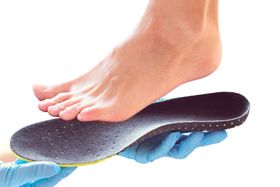5 Anti-Inflammatory Nutrients to Support Plantar Fasciitis Recovery
Discover how anti-inflammatory nutrients like vitamin C, vitamin D, and omega-3s may support your body's healing process when combined with proven plantar fasciitis treatments like orthotics and stretching.
Updated October 2, 2025

Imagine being stopped in your tracks—literally—by a sharp, searing pain with every step you take. Plantar fasciitis it's a persistent condition that can rob you of your mobility, independence, and quality of life.
If you're suffering, know this—healing isn't about waiting it out, but taking decisive, comprehensive action. One critical, often overlooked strategy? The power of targeted nutrition.
» Ease your plantar fasciitis pain: Get insoles molded to your foot
The Link Between Nutrition and Plantar Fasciitis
It's important to understand what nutrition can and can't do for plantar fasciitis. While certain vitamins and minerals support general healing and reduce systemic inflammation, there's very little evidence that supplementing with nutrients directly improves plantar fasciitis.
What we do know:
- Low levels of certain vitamins (particularly C and D) have been associated with increased pain and inflammatory conditions in various studies [1]
- Anti-inflammatory nutrients may support the body's natural repair processes
- Vitamin C is important for collagen synthesis, which is necessary for healthy connective tissue [2]
The most effective treatments so far include daily calf and fascia stretching, proper arch support, orthotics (prefabricated ones work as well as other types of custom orthotics), adequate rest, and activity modification.
Note: Nutrition should complement, not replace, these proven approaches.
» Still unsure whether custom orthotics are for you? Read the custom orthotics product review for everyday activities
How Nutrition Impacts Plantar Fasciitis
Often underestimated, nutrition plays a supporting role in managing plantar fasciitis.
By providing the body with the essential nutrients it needs, you can support your body's natural healing processes and help manage systemic inflammation.
However, it's important to understand that nutrition works best as part of a comprehensive treatment plan that includes mechanical interventions too.
A balanced diet rich in specific nutrients can:
- Reduce systemic inflammation: Chronic inflammation throughout the body can exacerbate foot pain and hinder healing.
- Support connective tissue repair: Essential nutrients help repair and maintain the elasticity of the plantar fascia, a crucial ligament in the foot.
- Improve overall cellular health: A strong and healthy body is better equipped to heal and fight inflammation.
- Promote better circulation: Increased blood flow delivers vital nutrients to the injured area, accelerating healing and reducing pain.
Note: Plantar fasciitis can be a stubborn condition. If you experience persistent or worsening foot pain, it's crucial to seek professional medical advice.
» Ease pain by inserting a pair of plantar fasciitis orthotics into your shoes
5 Nutrients That Help With Plantar Fasciitis Pain
In addition to helping with relief from plantar fasciitis pain, incorporating these vitamins and minerals into your diet can promote overall health and wellness. Here are some effective options to consider.
1. Vitamin C for Inflammation and Collagen Support
Vitamin C is essential for collagen synthesis—the protein that gives your plantar fascia structure. It also has antioxidant properties that help neutralize free radicals.
While vitamin C deficiency can weaken connective tissues, most research has focused on general wound healing rather than plantar fasciitis specifically. You can boost your intake through a variety of delicious foods, including:
- Citrus fruits provide a burst of vitamin C
- Vegetables like broccoli, Brussels sprouts, and green peppers
- Fruits such as melons, kiwis, and strawberries
» Explore our list of the worst shoes for plantar fasciitis
2. Vitamin D for Bone Health and Pain
Often called the 'sunshine vitamin,' vitamin D plays a role in calcium absorption and bone health. Some research links low vitamin D levels to musculoskeletal pain.
While deficiency may contribute to heel spurs, only about 50% of plantar fasciitis cases involve spurs. Natural sources of Vitamin D include:
- Fatty fish like salmon and sardines, which provide a double benefit of vitamin D and omega-3 fatty acids
- Eggs, mushrooms, and fortified soy milk
- Moderate sun exposure
3. Alpha-Lipoic Acid for Nerve Pain
Alpha-lipoic acid is an antioxidant that may help reduce inflammation. It's been studied mainly for nerve pain. To increase your intake, incorporate:
- Vegetables like spinach, carrots, broccoli, yams, beets, potatoes, tomatoes, and Brussels sprouts
- Red and organ meats
» Find out if a fresh pair of Birkenstocks can ease your plantar fasciitis
4. Resveratrol for Inflammation and Circulation
Resveratrol is a plant compound with antioxidant properties that may help reduce inflammation and improve circulation. Better circulation could support healing, though there's no specific research on plantar fasciitis.
It is found in these foods:
- Skin of red grapes
- Red wine
- Peanuts
- Several berries
5. B Vitamins for Nerve Health and Pain
B vitamins, particularly B1 (thiamine) and B6 (pyridoxine), support nerve health and energy metabolism. While they play a role in pain perception, there's no direct evidence that they improve plantar fasciitis specifically.
Sources of Vitamin B-1 (Thiamine) include:
- Pork
- Cereals
- Yeast extracts
Vitamin B-6 (Pyridoxine) can be found in:
- Fish
- Beef liver
- Potatoes
- Meat
Note: While supplements also provide these nutrients, they may interact with medications or cause unintended side effects. Always consult your doctor before starting a new supplement regimen.
» Learn what you shouldn't do with plantar fasciitis
What Actually Works for Plantar Fasciitis
Research consistently shows the following treatments provide the most reliable relief [3]:
- Stretching exercises target the calf muscles and plantar fascia. You'll need to stretch first thing in the morning before your first steps and multiple times throughout the day. This addresses the tight muscles found in 83% of stubborn cases.
- Orthotics and insoles for arch supports redistribute pressure away from painful areas. Prefabricated orthotics work just as well as custom versions, with 80% of people improving after eight weeks.
- Proper footwear with arch support and cushioned heels makes a real difference. You'll need to replace worn running shoes regularly and avoid walking barefoot on hard surfaces.
- Rest and activity modification give your plantar fascia time to heal. You'll need to reduce high-impact activities temporarily and try low-impact alternatives like swimming or cycling.
- Time and consistency matter most. About 90% of cases resolve within 6-12 months with consistent conservative treatment.
» Find out whether you need arch supports
Targeted Relief and Lasting Comfort From Plantar Fasciitis Pain
Nutrition is a supporting tool for managing inflammatory conditions, but it's not a standalone solution. A balanced diet rich in anti-inflammatory nutrients may help support your body's healing processes.
These nutrients work best as part of a comprehensive treatment plan that addresses the mechanical issues causing stress on the fascia. Upstep's Plantar Fasciitis Custom Orthotics insoles offer a breakthrough in managing your condition. They are sophisticated interventions designed to provide targeted relief.
By combining nutrient-rich foods and customized orthotic support, you're not just managing pain—you're reclaiming your mobility and quality of life.
References
Roxas, M. (n.d.). Plantar fasciitis: Diagnosis and therapeutic considerations. Altmedrev. https://altmedrev.com/wp-content/uploads/2019/02/v10-2-83.pdf
Alberts, A., Moldoveanu, E.-T., Niculescu, A.-G., & Grumezescu, A. M. (n.d.). Vitamin C: A Comprehensive Review of Its Role in Health, Disease Prevention, and Therapeutic Potential. MDPI. https://www.mdpi.com/1420-3049/30/3/748
Di Caprio, F., Gigli, M., & Ponziani, L. (2025). Plantar fasciitis: A literature review. Journal of Orthopaedics Trauma and Rehabilitation. https://doi.org/10.1177/22104917241303777
Disclaimer: The information on this blog is for educational purposes only and is not a substitute for professional medical advice. Upstep does not provide medical diagnosis or treatment. While qualified podiatrists create our content, it's essential to consult with your healthcare provider for any foot or ankle concerns you may have.
FAQs
Can taking vitamins cure my plantar fasciitis?
No. Vitamins support general healing but cannot cure plantar fasciitis alone. You need to address the mechanical stress through stretching, orthotics, proper footwear, and rest. Nutrition is supplementary, not a primary treatment.
How long does plantar fasciitis typically take to heal?
Most cases resolve within 6-12 months with consistent conservative treatment. About 90% of people improve without surgery. Early treatment combining multiple approaches tends to speed recovery.
Should I take vitamin supplements specifically for plantar fasciitis?
Focus on whole foods first—they absorb better and have fewer risks. If considering supplements, ask your doctor to test for deficiencies (especially vitamin D). Never replace proven treatments like stretching and orthotics with supplements.
What treatments should I combine with nutritional support?
Combine daily calf and fascia stretching, supportive footwear, orthotics, ice after activities, and activity modification. If you don't see improvement after 2-3 months of consistent treatment, consult a podiatrist.









